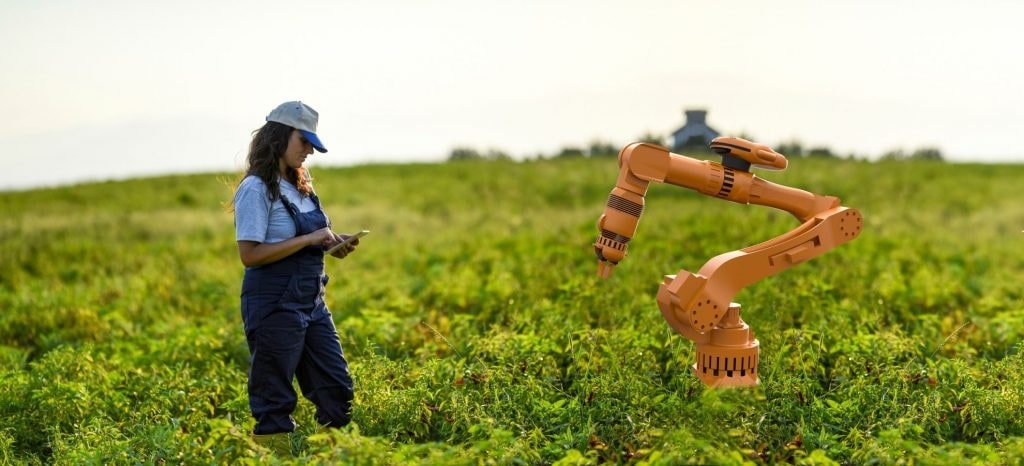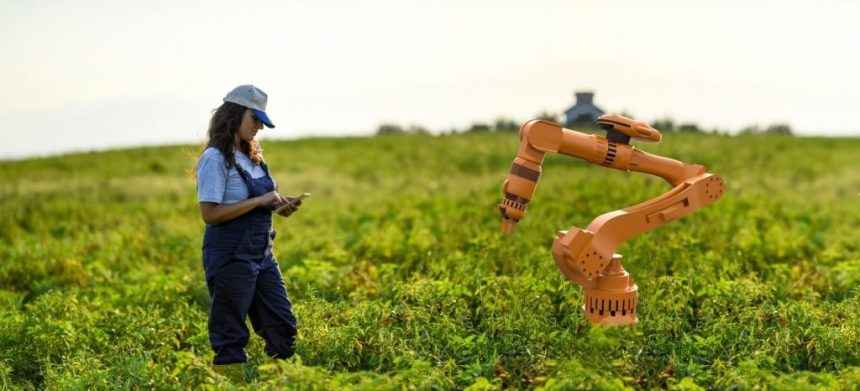In a world where the boundaries of innovation seem limitless, the age-old practice of farming has not been left behind. Brace yourself for a journey into the cutting-edge domain of smart agriculture, where sustainability triumphs and ingenuity blossoms. Welcome to a future where fields transform into living laboratories, nurturing a harmony between nature and technology. We embark on a fascinating exploration of the futuristic farming revolution, uncovering how this exhilarating blend of innovation and cultivation is reshaping our relationship with the earth. Step into the realm of smart agriculture, where seeds of change are sown, and a sustainable future takes root.

Innovative Solutions: Integrating IoT and AI to Optimize Farming Practices
Transforming the age-old methods of agriculture, the integration of Internet of Things (IoT) and Artificial Intelligence (AI) is revolutionizing the way we grow crops and manage farms. IoT technology is playing a key role in enhancing crop monitoring and management, allowing farmers to collect real-time data from sensors placed across the fields. This data, combined with AI algorithms, enables precision farming practices that optimize resource utilization and improve overall crop health. From monitoring soil moisture levels to tracking weather patterns, IoT and AI have given rise to smart agriculture systems that empower farmers with valuable insights and actionable recommendations.
- Leveraging IoT, farmers can monitor crucial parameters such as temperature, humidity, and soil nutrient levels, allowing for timely interventions and reducing the risk of crop failure.
- By connecting various farm equipment, such as tractors and irrigation systems, to IoT devices, farmers can streamline their operations and eliminate manual errors, leading to increased productivity.
- AI algorithms analyze the collected data and provide farmers with accurate predictions and recommendations regarding irrigation schedules, fertilization requirements, and pest control measures.
Building a Resilient Food System: Sustainable Practices for the Future
In the pursuit of a greener future, sustainable farming practices are key to ensuring a resilient food system. One such practice gaining momentum is organic farming, which promotes the elimination of synthetic chemicals and fertilizers. By embracing organic farming, farmers not only protect the environment but also produce healthier and safer food for consumers. Vertical farming is another innovative technique that holds great potential for sustainable agriculture. By growing crops in vertically stacked layers, this method maximizes crop yields while minimizing the land and water required. This technology-driven approach to farming mitigates the challenges posed by traditional agriculture, such as limited arable land and water scarcity.
- Organic farming promotes biodiversity and reduces soil erosion, preserving the long-term fertility of agricultural land.
- Vertical farming reduces the need for extensive land use, making it suitable for urban areas and enabling year-round harvesting.
- By utilizing hydroponic systems, vertical farming consumes significantly less water compared to traditional farming methods, addressing the growing concern of water scarcity.
Conclusion: Embracing the Smart Agriculture Revolution for a Sustainable Tomorrow
As the world grapples with the challenges of feeding a growing population while preserving natural resources, smart agriculture emerges as the beacon of hope. Integrating IoT and AI into farming practices revolutionizes the way we cultivate crops, enabling us to achieve sustainable food production and ecological balance. By embracing innovative technologies like IoT and AI, farmers can optimize their operations, conserve resources, and mitigate the environmental impact of traditional farming methods. Transforming agriculture through smart solutions not only ensures a green future but also secures resilience in the face of changing climatic conditions and increasing demands for food. Embracing this futuristic farming revolution is our pathway to a sustainable tomorrow.
As we wrap up our exploration into the futuristic farming revolution, it becomes increasingly evident that sustainable and efficient agriculture holds the key to our planet’s future. Through the lens of smart agriculture, we have witnessed the remarkable fusion of technology and farming practices, seamlessly pushing the boundaries of innovation.
With precision farming techniques, we have seen crops thriving in environments previously deemed inhospitable, while reducing the need for excessive water and fertilizers. The integration of Internet of Things (IoT) devices and sensors has allowed farmers to make data-driven decisions, ensuring optimal plant health and yielding bountiful harvests.
But the revolution extends far beyond just crop cultivation. Livestock farming has also undergone a profound transformation. From robotic feeding systems to intelligent monitoring, our animal counterparts are experiencing a new era of wellbeing and productivity. The utilization of smart technologies in animal agriculture not only maximizes efficiency but also minimizes the environmental impact, ultimately contributing to a greener and more ethical food production system.
Moreover, the implementation of vertical farming and hydroponics has revolutionized urban agriculture, addressing the pressing challenges of food security and limited space. Tall towers adorned with lush greenery defy conventional farming as we know it, enabling fresh produce to be cultivated within bustling city centers. These futuristic farms redefine the concept of sustainability by reducing transportation emissions and achieving year-round harvests.
Above all, the futuristic farming revolution serves as a testament to humanity’s adaptability and commitment towards safeguarding the environment. Through innovation and collaboration, farmers and technology experts are defying the limitations of conventional farming, ushering in an era of sustainable practices and efficient resource utilization. By embracing smart agriculture, we embark on a journey towards a future where abundance and harmony coexist.
In conclusion, the futuristic farming revolution has demonstrated that technology can be harnessed to cultivate a sustainable and resilient agriculture industry. This fusion of innovation and tradition not only feeds our growing population but also nurtures the health of our planet. As we continue pushing the boundaries of what is possible, let us embrace the transformative power of smart agriculture and ensure a bountiful future for generations to come.










